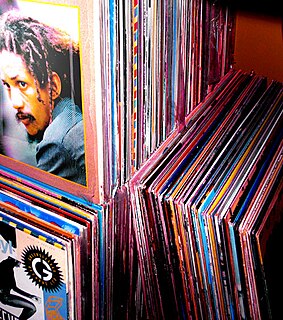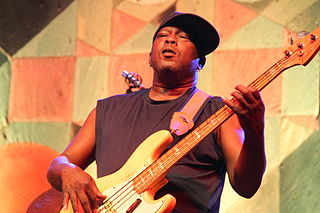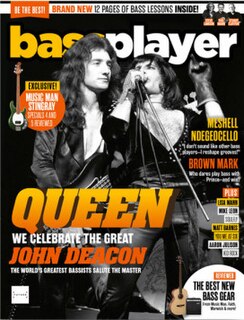
Horace Swaby, known as Augustus Pablo, was a Jamaican roots reggae and dub record producer, melodica player and keyboardist, active from the 1970s till his death.

Osbourne Ruddock, better known as King Tubby, was a Jamaican sound engineer who greatly influenced the development of dub in the 1960s and 1970s.

East of the River Nile is a 1977 reggae studio album by Jamaican musician Augustus Pablo. A purely instrumental album, East of the River Nile showcases Pablo's skill on the melodica, and various other keyboards. Also featured are studio musicians famous as members of The Wailers, Bob Marley's backing band.
Lloyd James, who is better known as Prince Jammy or King Jammy, is a dub mixer and record producer. He began his musical career as a dub master at King Tubby's recording studio. His dubs were known for their clear sound and use of effects.

King Tubbys Meets Rockers Uptown is a dub studio album by Augustus Pablo and King Tubby, released in 1976. It features Carlton Barrett on drums, Robbie Shakespeare and Aston Barrett on bass guitar, and Earl "Chinna" Smith on guitar. Pablo produced the album and played melodica, piano, organ and clavinet. The album was recorded at Randy's in Kingston, Jamaica. A distinctly different mix of the title song with vocals and dub, titled "Baby I Love You So", can be found on the Jacob Miller and Augustus Pablo 1975 album, Who Say Jah No Dread.
Heartbeat Records is an independent record label based in Burlington, Massachusetts. The label specializes in Jamaican music.
Blood and Fire is a British reggae record label specialising in reissues of 1970s dub.
Pressure Sounds is a British DIY record label, specializing in releasing reggae music. Run by Pete Holdsworth, it is one of the most enduring reggae labels in the UK, specializing in reissuing obsolete tunes. It was originally a subsidiary of On-U Sound.
Culture Press is an independent record label from UK specialized in Jamaican music.

Harry Zephaniah Johnson, known by the stage name Harry J, was a Jamaican reggae record producer.
Tommy McCook was a Jamaican saxophonist. A founding member of The Skatalites, he also directed The Supersonics for Duke Reid, and backed many sessions for Bunny Lee or with The Revolutionaries at Channel One Studios in the 1970s.
The Aggrovators were a dub/reggae backing band in the 1970s and 1980s, and one of the main session bands of producer Bunny Lee. The line-up varied, with Lee using the name for whichever set of musicians he was using at any time. The band's name derived from the record shop that Lee had run in the late 1960s, Agro Sounds. Alumni of the band included many musicians who later went on to make names for themselves in reggae music. Legends such as Jackie Mittoo, Sly and Robbie, Tommy McCook, and Aston Barrett were all involved with the band at one point or another. Other regular members included Carlton "Santa" Davis, Earl "Chinna" Smith, George "Fully" Fullwood, Ansel Collins, Bernard "Touter" Harvey, Tony Chin, Bobby Ellis, and Vin Gordon. The band recorded Lee's most popular output from the 1970s, with the instrumental B-sides of Lee's single releases on the Jackpot and Justice labels generally credited to The Aggrovators and mixed by King Tubby.
One drop rhythm is a reggae style drum beat.

This article contains the discography of reggae artist Burning Spear.
Earl Wilberforce "Wire" Lindo, sometimes referred to as Wya, was a Jamaican reggae musician. He was a member of Bob Marley and the Wailers and collaborated with numerous reggae artists including Burning Spear.

Earl "Chinna" Smith, a.k.a. Earl Flute and Melchezidek the High Priest, is a Jamaican guitarist active since the late 1960s. He is most well known for his work with the Soul Syndicate band and has recorded with many reggae artists, appearing on more than 500 albums.
Carlton "Santa" Davis is a musician from Jamaica, primarily known for his drumming with bands such as Bob Marley & The Wailers, The Aggrovators, Soul Syndicate and Roots Radics. He has worked with reggae artists such as Jimmy Cliff, Black Uhuru, Burning Spear, Big Youth, The Wailers, Peter Tosh, Andrew Tosh, Wailing Souls, Ini Kamoze, Big Mountain, Michael Rose, and Ziggy Marley.
Delroy Washington is a Jamaican-British reggae singer best known for his releases for Virgin Records in the late 1970s.

Midnight Raver is a website dedicated solely to the promotion and preservation of roots reggae, culture, and dub. Contributors include authors and journalists, historians, record producers, broadcasters, lecturers, archivists, collectors and publishers.













